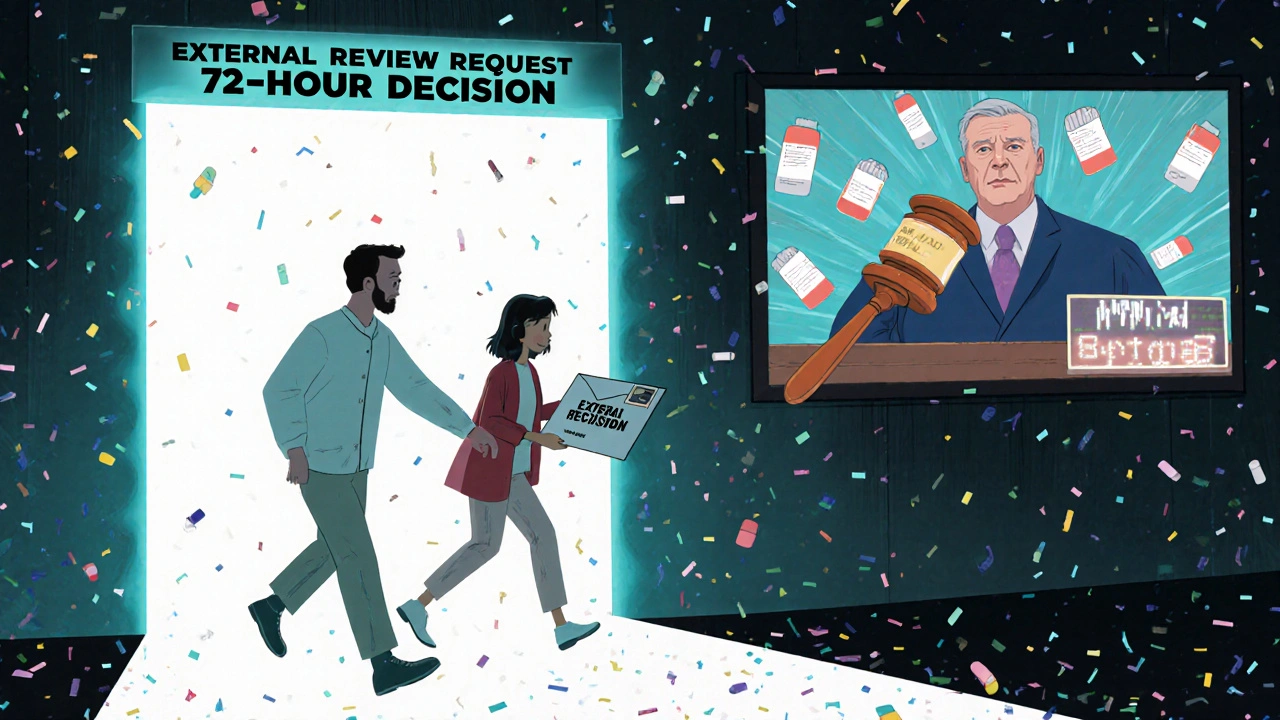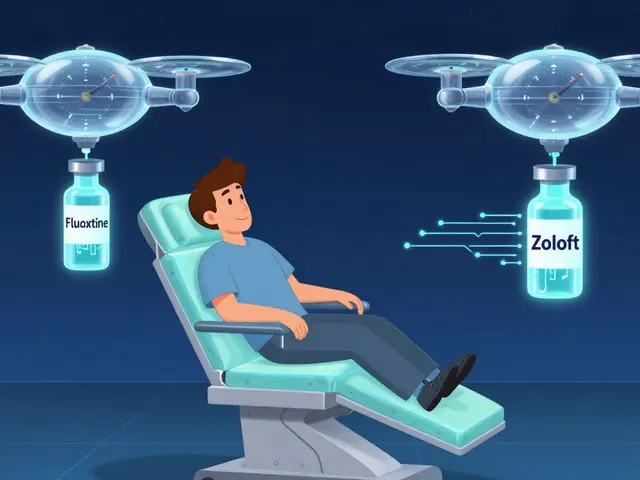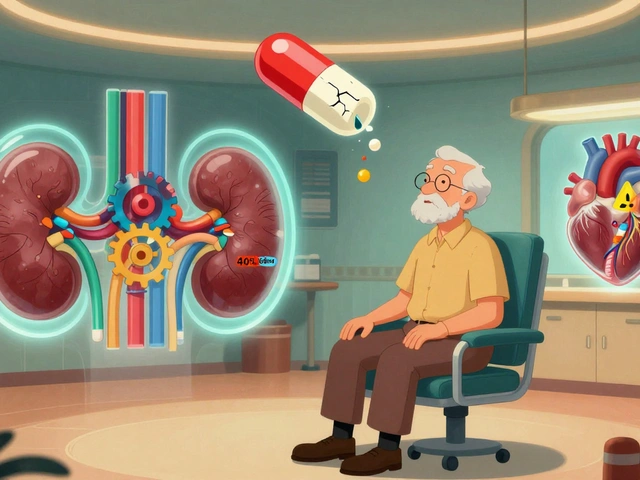When your doctor prescribes a brand-name medication but your insurance forces you to switch to a cheaper generic version - and the generic doesn’t work for you - you’re not alone. Thousands of people face this every month. Insurance companies use formularies and step therapy rules to cut costs, but sometimes those rules ignore real medical needs. The good news? You can fight back. And if you do it right, your appeal has a better than 70% chance of succeeding.
Understand Why Your Insurance Denied Your Prescription
Your first step is reading the Explanation of Benefits (EOB) letter from your insurer. This isn’t just a bill. It’s your roadmap. Look for phrases like “step therapy required,” “generic substitution mandated,” or “prior authorization denied.” These aren’t random decisions. They’re based on your plan’s formulary - a list of drugs the insurer will cover, often with restrictions. Most denials happen because your drug is on a “step therapy” protocol. That means your insurer wants you to try cheaper alternatives first, even if your doctor says they won’t work. For example, if you have rheumatoid arthritis and your doctor prescribed adalimumab (Humira), your insurer might require you to try etanercept (Enbrel) or a generic TNF blocker first. If you’ve already tried those and had bad side effects or no improvement, you need to prove it.Gather the Right Documentation
The single biggest factor in winning an appeal? Detailed, specific documentation from your doctor. Not a vague note. Not a checkbox form. A letter that answers three key questions:- Why won’t the generic work for you? List specific side effects: rashes, nausea, dizziness, worsening symptoms. Mention if you had a reaction to a similar generic before.
- What happened when you tried alternatives? Did you try two or three generics? Did they fail? Include dates, dosages, and outcomes. Example: “Patient tried generic metformin 500mg twice daily for 8 weeks in 2024; HbA1c remained at 9.2% with persistent polyuria and fatigue.”
- What do medical guidelines say? Cite sources like the American Diabetes Association, American College of Rheumatology, or UpToDate. Example: “Per ACR 2023 Guidelines, biologic therapy is recommended for patients with inadequate response to two DMARDs.”
Submit the Formal Appeal - Don’t Wait
You have 180 days from the denial date to file an internal appeal with your insurer. For Medicare Part D, you only have 120 days. Don’t assume they’ll remind you. Set a calendar alert. Most insurers have a form - often called a “Prior Authorization Exception Request” or “Step Therapy Exception Form.” Get it from their website or call customer service. Fill it out completely. Attach your doctor’s letter. Include your name, member ID, prescription number, and the exact drug name (both brand and generic). Pro tip: Send it certified mail with return receipt. Keep copies of everything. If you email it, save the confirmation. Paper trails matter.
Ask for a Peer-to-Peer Review
This is the secret weapon most patients don’t know about. When you submit your appeal, request a “peer-to-peer review.” That means your doctor talks directly to the insurance company’s medical director. It sounds simple, but it’s powerful. A 2023 study by the American Medical Association found that 75% of appeals with a peer-to-peer call were approved. Why? Because a doctor-to-doctor conversation cuts through bureaucracy. The insurer’s doctor hears firsthand why the generic won’t work - not from a form, but from someone who treats you. Your doctor’s office usually handles this. Ask them: “Can you call the medical director to discuss my case?” Most practices have a process for this. If they say no, offer to help them draft a script. Many doctors don’t know this option exists.What If They Still Say No?
If your internal appeal is denied, you get one more shot: an external review. This is where an independent third party - not your insurer - looks at your case. This step is automatic for Medicare Part D appeals after the second level. For commercial plans, you must request it within 60 days of the internal denial. In states like California and New York, external reviews are fast. New York requires a decision within 72 hours for urgent cases. California’s Department of Insurance approves 92% of formal complaints that go to external review. You don’t need a lawyer. Most state insurance departments have free appeal advocates. Call your state’s insurance commissioner’s office. They’ll guide you through the process - for free.Real Cases That Worked
A 54-year-old woman with lupus was denied coverage for mycophenolate mofetil (CellCept). Her insurer wanted her to try azathioprine first. She’d had severe bone marrow suppression with azathioprine in 2021. Her doctor’s letter included lab results showing her white blood cell count dropped to 1,800 - dangerous levels. She attached a 2022 American College of Rheumatology guideline supporting mycophenolate as first-line for lupus nephritis. Appeal approved in 11 days. A teenager with Type 1 diabetes was denied semaglutide (Ozempic) because his insurer said insulin was “sufficient.” He’d had six severe hypoglycemic episodes in six months on insulin. His endocrinologist documented each episode with glucose logs and ER visits. The appeal cited ADA guidelines on GLP-1 agonists for high-risk T1D patients. Approved on second appeal.
What to Avoid
Don’t wait until you run out of pills. Start the appeal as soon as you’re denied. Delays can cost you your dose. Don’t let your doctor write a generic letter like “This drug is necessary.” That gets rejected. Be specific. Use numbers, dates, side effects, and guidelines. Don’t assume your pharmacist will help. Pharmacists can’t override insurance decisions. They can help you find forms, but they can’t write medical justifications. Don’t ignore deadlines. Miss one, and you lose your right to appeal - unless you have extenuating circumstances (like hospitalization). Even then, you’ll need proof.How Long Does It Take?
Standard appeals: 30 days for new prescriptions, 60 days for ongoing ones. Urgent cases (if you’re at risk of serious harm): 4 business days. External reviews: 7-15 days, depending on your state. The Crohn’s & Colitis Foundation tracked 1,247 appeals in 2023. The average time from denial to approval was 52 days. But cases with peer-to-peer reviews were resolved in 18 days on average.Why This Matters
This isn’t just about pills. It’s about safety. A 2023 Johns Hopkins study found that 41% of failed urgent appeals were due to paperwork errors - not medical reasons. People got sicker while waiting. One patient with MS delayed starting a critical drug for six weeks because the appeal form was filled out wrong. Her relapse cost $87,000 in emergency care. The system is broken - but it’s fixable. You have rights. Your doctor has tools. And if you follow these steps, you’re not just fighting for a prescription. You’re fighting for care that actually works for you.What if my insurance says the generic is just as good?
Insurers often claim generics are “therapeutically equivalent,” but that doesn’t mean they’re identical. Generics have the same active ingredient, but fillers, binders, and coatings can differ. For some people, those differences cause side effects or reduce effectiveness. Your doctor’s letter must explain why your body reacts differently - not just that you “prefer” the brand.
Can I appeal if I’m on Medicare Part D?
Yes. Medicare Part D has a five-level appeal process. Start with a Coverage Determination Request (Form CMS-10456), then move to redetermination, reconsideration, an independent review, and finally a federal court hearing if needed. The second level - independent review - has the highest success rate at 63%. You can get free help from the Medicare Rights Center or your State Health Insurance Assistance Program (SHIP).
Do I need a lawyer to appeal?
No. Most appeals are won without legal help. The key is documentation and timing. If your case is complex or involves a chronic condition like cancer or MS, a patient advocate or legal aid group can help - but you don’t need to pay for a private attorney. Contact your state’s insurance commissioner or a nonprofit like the Patient Advocate Foundation.
What if my doctor won’t help with the appeal?
Call their office again. Ask to speak to the nurse or medical records coordinator. Many doctors’ offices have staff trained to handle appeals. If they still refuse, ask for a referral to another provider who will. You can also contact your state medical association - they often have resources for patients in this situation.
How do I know if my drug is on step therapy?
Check your plan’s formulary online. Look for icons like “Step Therapy Required” or “Prior Authorization Needed.” You can also call your insurer and ask: “Is [drug name] subject to step therapy?” They’re required by law to answer. If you’re on Medicare, use the Medicare Plan Finder tool. If you’re on Medicaid, check your state’s website - rules vary.





Clifford Temple
November 21, 2025 AT 08:17This whole system is a joke. Insurance companies are just profit-driven monsters that don't care if you die waiting for your meds. They'd rather you go bankrupt than pay for what actually works. And don't get me started on how they force you to try 5 generics that make you puke before they'll even look at the real drug. It's not healthcare-it's corporate torture.
Corra Hathaway
November 23, 2025 AT 08:12YASSSSS this is so needed!! 🙌 I fought for 3 months to get my son his real ADHD med after the generic turned him into a zombie. Doctor wrote a letter, we called 17 times, did the peer-to-peer thing-and BAM. Approved. They think we're dumb. We proved them wrong. 💪❤️
Shawn Sakura
November 24, 2025 AT 16:33Hey guys, just wanted to say thank you for this guide-it's super helpful. I just got approved for my biologic after using these steps. My doc didn't even know about peer-to-peer reviews at first, but once I explained it, he was all in. We called the insurer, talked for 12 minutes, and they approved it that day. I'm so relieved. Don't give up. You got this. 😊
Paula Jane Butterfield
November 25, 2025 AT 15:34As someone who's helped 30+ patients navigate this mess, I can't stress enough: the doctor's letter has to be specific. Not 'this drug is necessary'-but 'patient developed Stevens-Johnson syndrome after generic metformin, HbA1c dropped 0.3% in 6 weeks on generic, per ADA 2023 guidelines, biologics are indicated after failure of two oral agents.' That's what gets them to listen. Also-always send certified mail. I've seen 12 appeals denied because they 'never received' the email. Paper trail = power.
Swati Jain
November 27, 2025 AT 10:25Let me be blunt-this is capitalism at its finest. Insurance companies are legally allowed to gamble with people's lives because generics are cheaper. They don't care about your quality of life. They care about their quarterly earnings. And the fact that 78% of approved appeals include clinical guidelines? That's not luck. That's proof that bureaucracy only responds to jargon. If you're not quoting UpToDate or ACR, you're just yelling into the void.
Florian Moser
November 29, 2025 AT 07:17Excellent breakdown. One correction: for Medicare Part D, the independent review (level 4) has a 63% approval rate, not the second level. The second level is redetermination, which is usually denied. Also, always include your member ID and RX number in every submission-even if it seems obvious. I've seen appeals get lost because of missing identifiers. Small details win big battles.
jim cerqua
November 30, 2025 AT 22:08MY GOD. I just got denied for my MS drug AGAIN. I’ve been on this rollercoaster for 14 months. I’ve cried in parking lots. I’ve begged my doctor. I’ve sent 7 letters. I’ve called 47 times. I’ve had panic attacks wondering if I’ll ever walk without a cane again. And now? Now I’m supposed to just follow a ‘step-by-step guide’ like this is a damn IKEA manual? This isn’t a checklist. This is my LIFE. And they’re treating me like a spreadsheet error.
Sammy Williams
December 1, 2025 AT 20:36Just did this last month. Got my brand-name antidepressant approved after 2 generics made me suicidal. Peer-to-peer was the game-changer. My doc called, talked to the med director for 8 minutes, and they approved it right then. No paperwork, no waiting. Just two doctors talking like humans. So simple. Why don't more people know this?
Sheldon Bazinga
December 2, 2025 AT 13:54Lmao this is so basic. You're telling people to 'ask their doctor'? Newsflash: doctors are just corporate shills who get paid to push the insurer's agenda. Most of 'em won't lift a finger unless you pay them extra. And 'peer-to-peer'? Yeah right. The insurance doctor is just a guy who reads from a script. This whole thing is rigged. You need a lawyer, a lobbyist, and a CNN segment to get your meds. Stop pretending this is fair.
Sandi Moon
December 3, 2025 AT 11:44One must question the underlying epistemology of this 'guide.' The assumption that insurers are merely bureaucratic inefficiencies is naive. The real issue lies in the medical-industrial complex's collusion with pharmaceutical monopolies. Generics are not inferior-they are the logical outcome of market regulation. The real villain is the patent system that allows brand-name drugs to be priced at $12,000/month while the 'generic' is merely a cost-efficient alternative. This article is a distraction-a neoliberal placebo for the gullible.
Kartik Singhal
December 4, 2025 AT 15:22Bro this is so 2018. Everyone knows insurance companies are just AI bots that auto-reject everything. The real solution? Get your meds from India. I ordered my Humira from a pharmacy in Delhi for $120/month. No appeal. No paperwork. No drama. 🇮🇳💊 Just send cash via Western Union and boom-you're covered. Why are we still playing their rigged game?